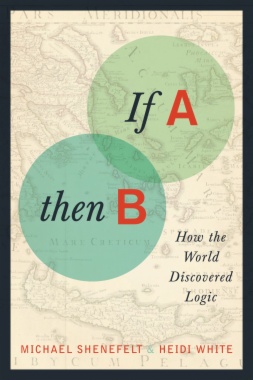While logical principles seem timeless, placeless, and eternal, their discovery is a story of personal accidents, political tragedies, and broad social change. If A, Then B begins with logic's emergence twenty-three centuries ago and tracks its expansion as a discipline ever since. It explores where our sense of logic comes from and what it really is a sense of. It also explains what drove human beings to start studying logic in the first place.
Logic is more than the work of logicians alone. Its discoveries have survived only because logicians have also been able to find a willing audience, and audiences are a consequence of social forces affecting large numbers of people, quite apart from individual will. This study therefore treats politics, economics, technology, and geography as fundamental factors in generating an audience for logic—grounding the discipline's abstract principles in a compelling material narrative. The authors explain the turbulent times of the enigmatic Aristotle, the ancient Stoic Chrysippus, the medieval theologian Peter Abelard, and the modern thinkers René Descartes, David Hume, Jeremy Bentham, George Boole, Augustus De Morgan, John Stuart Mill, Gottlob Frege, Bertrand Russell, and Alan Turing. Examining a variety of mysteries, such as why so many branches of logic (syllogistic, Stoic, inductive, and symbolic) have arisen only in particular places and periods, If A, Then B is the first book to situate the history of logic within the movements of a larger social world.
If A, Then B is the 2013 Gold Medal winner of Foreword Reviews' IndieFab Book of the Year Award for Philosophy.
- Table of Contents
- Preface
- Introduction: What Is Logic?
- The Strange Nature of Logical Validity
- What Makes a Valid Argument Valid?
- The Divine-Command Theory of Logic
- Logic as Culturally Invariant
- Logic as Timeless and Placeless
- The Social History of Logic
- 1. The Dawn of Logic
- The Effect of Geography on the Flow of Ideas
- The Effect of the Sea Trade
- Transportation and Civilization
- Classical Greece as the Extreme Case
- The Athenian Assembly
- 2. Aristotle: Greatest of the Greek Logicians
- The Study of Argument in India
- The Singularity of Aristotle
- The Effect of the Athenian Assembly
- The Sophists
- The Separation of Logic from Rhetoric
- 3. Aristotle's System: The Logic of Classification
- Manipulating Classes
- The Square of Opposition
- The Underlying Mystery of the Square
- Wittgenstein's Proposed Solution
- Wittgenstein's Mistake
- 4. Chrysippus and the Stoics: A World of Interlocking Structures
- The Stoics
- The Logic of Choice
- The Nature of Compound Propositions
- Interlocking Forms of Argument
- The Laws of Contradiction and Excluded Middle
- More Interlocking Forms
- The Basis of Computer Logic
- 5. Logic Versus Anti-Logic: The Laws of Contradiction and Excluded Middle
- Paradoxes of Truth
- The Nature of Fuzzy Logic
- Is Validity Relative?
- Does Formal Logic Ultimately Depend on Common Sense?
- 6. Logical Fanatics, Circular Reasoning, and Descartes's Fundamental Principle
- The Origins of the Wars of Religion
- The Importance of Firm Foundations
- The Logical Complexity of Our Premises
- The Origins of Formalized Logic and Mathematics
- The Paradoxes of Formalization
- The Double Meaning of "Foundations"
- The Outlook of Thomas Kuhn
- Kuhn's Error
- Competition Between Scientific Theories
- 7. Will the Future Resemble the Past?: Inductive Logic and Scientific Method
- The Challenge of the New Literature
- The Triumph of the Vernacular and the Growing Spirit of Equality
- The Rise of Modern Political Theory
- The Right of Dissent and the Reliance on Induction
- Induction as the New Rationality
- Aristotle's Influence on the Medievals
- The Rational Foundations of Induction
- The Apparent Irreducibility of Induction
- The Assumptions of Empirical Science
- 8. Rhetorical Frauds and Sophistical Ploys: Ten Classic Tricks
- The Battle for Parliamentary Reform
- Jeremy Bentham and the Legacy of the Enlightenment
- Bentham's Book of Fallacies
- 9. Symbolic Logic and the Digital Future
- The Impact of the Industrial Revolution
- The Origins of Symbolic Logic
- The Logic of Relations
- The Effect of the New Mathematics
- The Impact of Quantification
- Frege's New Foundation for Mathematics
- The Invention of Digital Computing
- 10. Faith and the Limits of Logic: The Last Unanswered Question
- Abelard's Rise to Power
- Abelard's Attack on Faith Without Reason
- Are Faith and Reason Compatible?
- The Foundations of Rational Belief
- Rationality After the Wars of Religion
- The Vigilance of Reason
- Appendix: Further Fallacies
- Notes
- Bibliography
- Index

